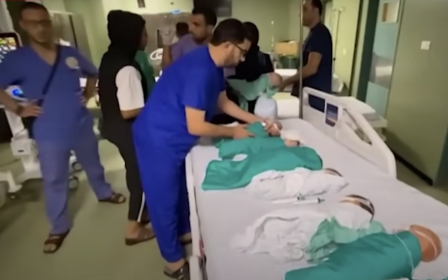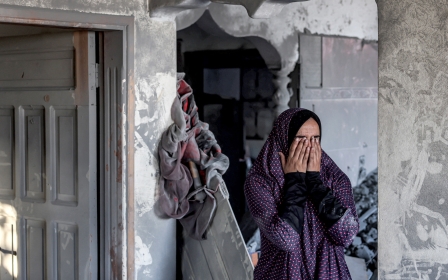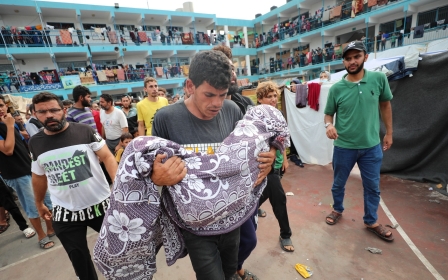Israel-Palestine war: Rain brings a mixed blessing for Gaza’s displaced
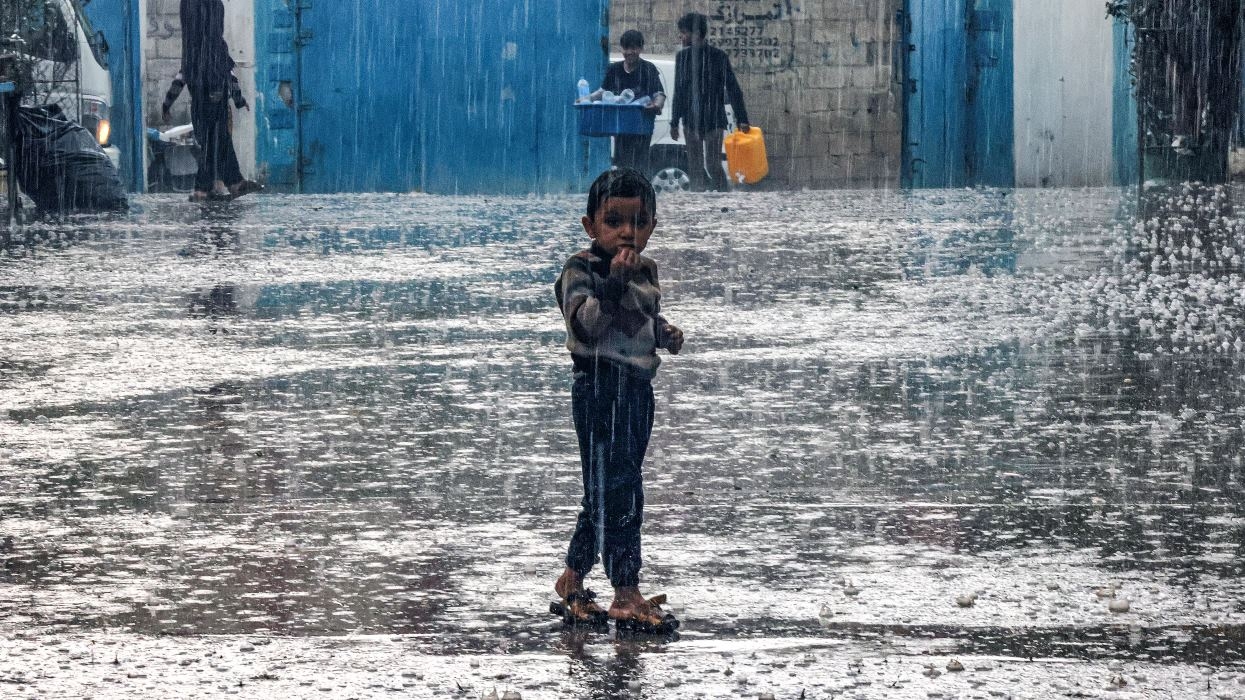
Walaa Rabah struggles to keep her children’s blankets dry as rain pours down on their tent inside a school in Deir al-Balah in central Gaza.
The 38-year-old moved to the school, run by the United Nations agency for Palestinian refugees (UNRWA), in order to escape Israel’s bombardment but, besides the ever-present risk of an air strike, there’s a new source of misery setting in.
Winter is coming, the rains have arrived and the temperatures are dropping.
For a population already beset with food insecurity, little drinkable water and the constant threat of death, the weather is adding to the struggles of Palestinians in Gaza.
"Since we arrived at the school. Since the first day. We’ve been worried that this day would come, a day when it would rain heavily on us while we’re in our tents,” Rabah told Middle East Eye.
New MEE newsletter: Jerusalem Dispatch
Sign up to get the latest insights and analysis on Israel-Palestine, alongside Turkey Unpacked and other MEE newsletters
“The situation is already bad, but when it rains, it gets unbearable, not just because we get wet and cannot sleep the whole night, but also because the mud covers all our stuff and food that we have nowhere to keep but on the ground."
The mother of five says that the sight of rain causes a panic among the camp’s residents, forcing them to run frantically looking for plastic bags to cover their belongings.
Follow Middle East Eye's live coverage for the latest on the Israel-Palestine war
When Rabah’s family arrived at the school on 17 October, its classrooms were already full with the hundreds of families who had fled their homes.
Its original capacity was just 700 people but the school now has dozens of tents set up within its grounds that now house approximately 7,000 displaced Palestinians.
That density of human settlement has put a strain on sanitation facilities, and the influx of rainwater heightens the risk of water-borne illnesses.
A mixed blessing
But the influx of rain is also a blessing for a population denied water supplies after Israel cut them off in the early weeks of its assault on Gaza.
In another UNRWA-run school in Khan Younis in southern Gaza, displaced families rushed to place containers under the downpour to collect water to use for cleaning, drinking, and bathing.
'We have been sleeping on the ground for weeks, with no mattresses and no pillows, we just put one blanket underneath us'
- Abu Ahmed Qaradaia, Gaza
For three weeks, displaced people at the school say they have not been able to get bottled mineral water or other water that is safe to drink, while the water they receive is “yellowish and contaminated".
“I’m not lying to you when I say this is the first time we’ve seen clean water in the past 20 days,” said Abu Ahmed Qaradaia.
“When we came here, we brought some water bottles with us but after those finished, we couldn’t find clean water anywhere,” the 61-year-old explained in a conversation with MEE.
“Rainwater isn’t very clean compared to mineral water but still it isn’t contaminated like the water we (normally) drink, which causes diseases.”
But relief from thirst comes with a price. Qaradaia described the cold conditions at night brought about by the rain and the damage that water has done to the possessions of the displaced.
Around 1.6 million Palestinians in Gaza have been displaced from their homes since Israel started its bombardment of the territory.
A substantial number of those are taking refuge in UN-run facilities, including schools
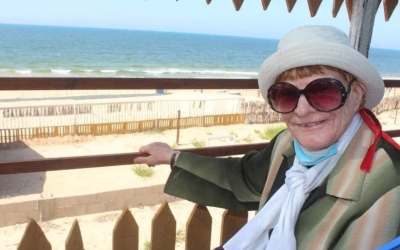
At least 253 schools have been destroyed by Israel over the past six weeks, according to the Palestinian government’s media office.
“At night, it gets very cold,” Qaradaia said, adding, “Each one of us has only one blanket which we were given as part of an aid bag we received from UNRWA.
“When we fled our homes, we did not bring any blankets or mattresses with us, we could barely bring the essentials. We have been sleeping on the ground for weeks, with no mattresses and no pillows, we just put one blanket underneath us.”
The rain soaked blankets and muddied the grounds of the school, making it difficult to sleep or even sit, according to Qaradaia.
"Some of us left our tents and went to seek shelter from the rain in the school’s corridors and on the stairs, others stood under the trees or covered their heads with plastic bags,” he said.
"Our life does not stop getting harder in schools. Every time we reach a point where we say this is the hardest, the next day it gets even harder."
Middle East Eye delivers independent and unrivalled coverage and analysis of the Middle East, North Africa and beyond. To learn more about republishing this content and the associated fees, please fill out this form. More about MEE can be found here.


